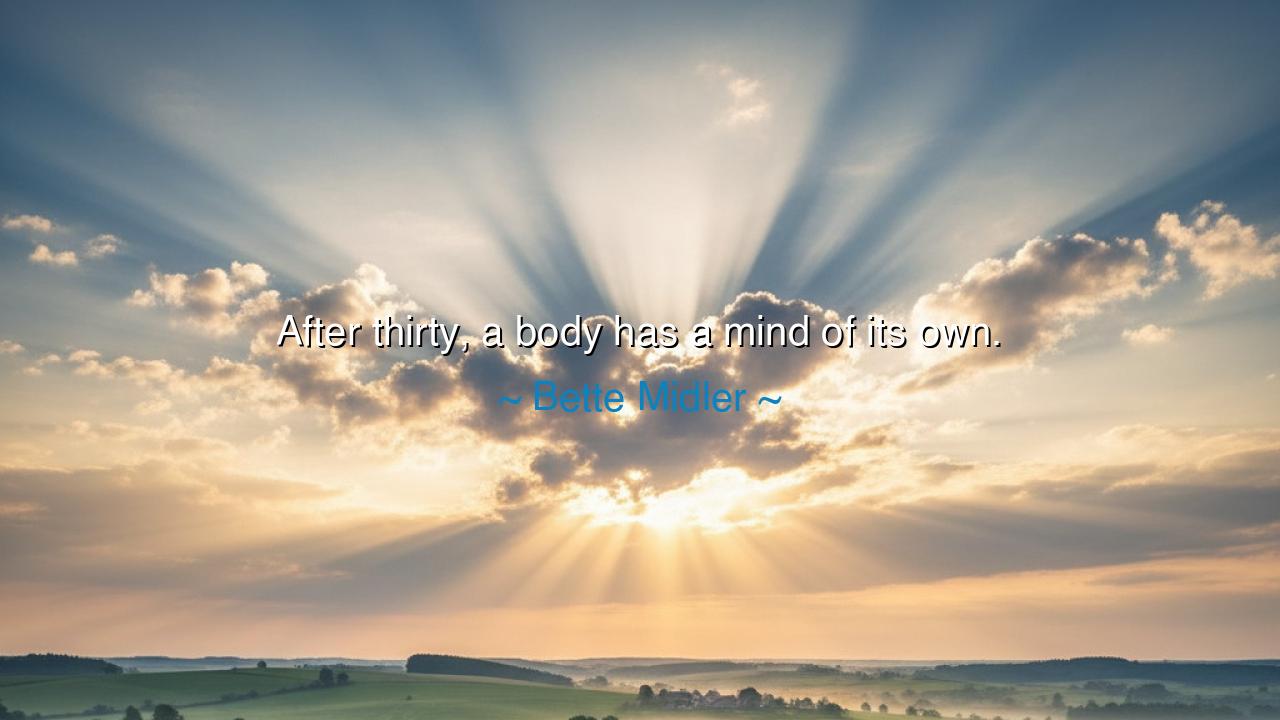
After thirty, a body has a mind of its own.






Gather close, O seekers of wisdom, and listen to the words of Bette Midler, for in her light-hearted remark lies a truth that touches the core of human experience: “After thirty, a body has a mind of its own.” These words speak to a shift that all who walk the path of life must recognize. In the days of youth, the body is a vessel that responds eagerly to the will of the spirit, capable of great feats and boundless energy. But as the years pass, a subtle transformation occurs, and with it, the realization that the body does not always heed our commands. It develops a mind of its own, one that is governed by its own rhythms, limitations, and needs.
The ancient sages knew well the ways of the body and the soul. The great Hippocrates, father of medicine, understood that the body is a temple, but also a fragile vessel, susceptible to the forces of time. In his teachings, he spoke of the balance between body and mind, knowing that as one ages, the body begins to act according to its own laws. No matter how strong or vibrant a person may be in their youth, there comes a time when the body begins to follow its own natural course, independent of the spirit’s desires. Hippocrates taught that true health is not just the absence of disease, but the harmony between the soul’s will and the body’s wisdom. In the transition to maturity, the body begins to assert itself, dictating the pace and direction of one’s life.
Consider, too, the example of the mighty Alexander the Great, whose conquests knew no limits, whose ambitions were as grand as the heavens themselves. Yet, even he, in the midst of his victories, was not immune to the decline of the body. The young king, whose strength and vitality seemed endless, found that with time, his body began to rebel against the demands he placed upon it. It is said that, despite his desire to continue his military campaigns, Alexander’s body could no longer keep up with his will. His insatiable drive to conquer the world met the inevitable limitations of his flesh, and in that moment, he experienced the truth that Midler so playfully alludes to: the body, though once an obedient servant to his ambition, had begun to move with its own mind, slower and more reluctant than before.
Bette Midler’s words also call attention to the truth that the body’s rebellion is not something to be feared, but something to be understood and embraced. Plato, in his dialogues, often spoke of the body as both a companion and a challenger to the spirit. The soul seeks knowledge and enlightenment, while the body seeks rest, food, and comfort. In youth, the body is easily controlled, its desires subdued by the strength of the spirit. But as one passes into the later years, the body begins to take on a mind of its own, responding to its own rhythms, desires, and needs. It demands attention and care, reminding the spirit that it too must be treated with respect.
This phenomenon of the body asserting its will is not something that occurs only in the lives of the greatest conquerors or philosophers. It is a universal experience that we all must face. Even the stoics, with their teachings of control over one’s emotions and desires, could not escape the natural decline of the body. Marcus Aurelius, the wise emperor, despite his deep understanding of the mind’s power over the body, could not avoid the pain and ailments that accompanied his later years. His journals reveal a man who, while seeking tranquility and wisdom, also wrestled with the physical realities of aging. Yet, in this, he found a deeper understanding of life—that the body, while a powerful force, is ultimately a temporary vessel for the soul’s journey.
The lesson of Midler’s quote, then, is one of acceptance. It is a call to recognize the changing relationship between mind and body as we grow older. The body may no longer be able to do all that it once did, and it may have its own ideas about how much it can give. But this is not a tragedy—it is simply the nature of life. To age is to learn to listen to the body, to honor its needs, and to reconcile with its limitations. The spirit may still soar, but it must be tempered by the wisdom of the body, which moves at its own pace.
So, what action shall we take in our own lives? The lesson is this: embrace the changes that come with age and with the body’s growing independence. Do not resist, but listen to what your body is telling you. Allow it to lead you to a deeper understanding of your own self. Take care of the body, but also allow the spirit to find new freedoms in the evolving relationship. As we grow older, let us cultivate patience, wisdom, and gratitude for the body that has carried us this far. Know that in its rebellion lies the opportunity for growth, for acceptance, and for a deeper connection to the ever-changing rhythm of life. Let the mind of the body guide us gently, and in doing so, we find a new kind of strength—one that comes from harmony, not resistance.






AAdministratorAdministrator
Welcome, honored guests. Please leave a comment, we will respond soon